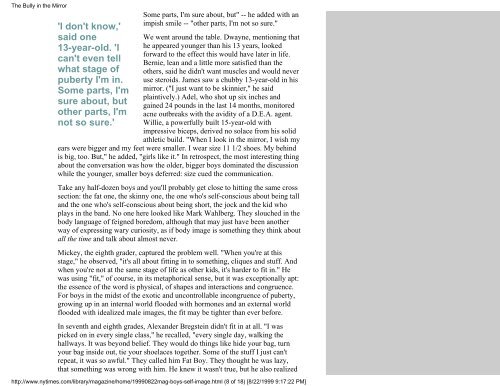The New York Times Magazine, Sunday, August 22, 1999
The New York Times Magazine, Sunday, August 22, 1999
The New York Times Magazine, Sunday, August 22, 1999
You also want an ePaper? Increase the reach of your titles
YUMPU automatically turns print PDFs into web optimized ePapers that Google loves.
<strong>The</strong> Bully in the Mirror<br />
'I don't know,'<br />
said one<br />
13-year-old. 'I<br />
can't even tell<br />
what stage of<br />
puberty I'm in.<br />
Some parts, I'm<br />
sure about, but<br />
other parts, I'm<br />
not so sure.'<br />
Some parts, I'm sure about, but" -- he added with an<br />
impish smile -- "other parts, I'm not so sure."<br />
We went around the table. Dwayne, mentioning that<br />
he appeared younger than his 13 years, looked<br />
forward to the effect this would have later in life.<br />
Bernie, lean and a little more satisfied than the<br />
others, said he didn't want muscles and would never<br />
use steroids. James saw a chubby 13-year-old in his<br />
mirror. ("I just want to be skinnier," he said<br />
plaintively.) Adel, who shot up six inches and<br />
gained 24 pounds in the last 14 months, monitored<br />
acne outbreaks with the avidity of a D.E.A. agent.<br />
Willie, a powerfully built 15-year-old with<br />
impressive biceps, derived no solace from his solid<br />
athletic build. "When I look in the mirror, I wish my<br />
ears were bigger and my feet were smaller. I wear size 11 1/2 shoes. My behind<br />
is big, too. But," he added, "girls like it." In retrospect, the most interesting thing<br />
about the conversation was how the older, bigger boys dominated the discussion<br />
while the younger, smaller boys deferred: size cued the communication.<br />
Take any half-dozen boys and you'll probably get close to hitting the same cross<br />
section: the fat one, the skinny one, the one who's self-conscious about being tall<br />
and the one who's self-conscious about being short, the jock and the kid who<br />
plays in the band. No one here looked like Mark Wahlberg. <strong>The</strong>y slouched in the<br />
body language of feigned boredom, although that may just have been another<br />
way of expressing wary curiosity, as if body image is something they think about<br />
all the time and talk about almost never.<br />
Mickey, the eighth grader, captured the problem well. "When you're at this<br />
stage," he observed, "it's all about fitting in to something, cliques and stuff. And<br />
when you're not at the same stage of life as other kids, it's harder to fit in." He<br />
was using "fit," of course, in its metaphorical sense, but it was exceptionally apt:<br />
the essence of the word is physical, of shapes and interactions and congruence.<br />
For boys in the midst of the exotic and uncontrollable incongruence of puberty,<br />
growing up in an internal world flooded with hormones and an external world<br />
flooded with idealized male images, the fit may be tighter than ever before.<br />
In seventh and eighth grades, Alexander Bregstein didn't fit in at all. "I was<br />
picked on in every single class," he recalled, "every single day, walking the<br />
hallways. It was beyond belief. <strong>The</strong>y would do things like hide your bag, turn<br />
your bag inside out, tie your shoelaces together. Some of the stuff I just can't<br />
repeat, it was so awful." <strong>The</strong>y called him Fat Boy. <strong>The</strong>y thought he was lazy,<br />
that something was wrong with him. He knew it wasn't true, but he also realized<br />
http://www.nytimes.com/library/magazine/home/<strong>1999</strong>08<strong>22</strong>mag-boys-self-image.html (8 of 18) [8/<strong>22</strong>/<strong>1999</strong> 9:17:<strong>22</strong> PM]






